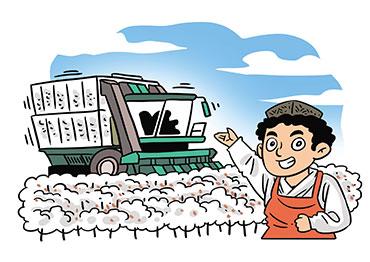“In the past, we employed 20-30 laborers, mostly from local ethnic groups, to help us pick cotton at 0.7-0.8 yuan (US$0.1) per kilogram. The price rose to about 2 yuan (US$0.3) per kilo. In the last two years, machines have gradually replaced manual labor. So what forced labor are they talking about?”
Nuradli Wublikas, a young Uygur man from Xinjiang Uygur Autonomous Region who spoke to State-run media outlet the Global Times in late June, saying he and other Uygurs are planning to sue the Australian Strategic Policy Institute, a think tank, for accusing the Chinese government of forcing Uygurs to perform manual labor
“What we’re actually doing is not eliminating infectious disease, but controlling its spread.”
Zhang Wenhong, infectious disease expert at Huashan Hospital, Fudan University, at the 2021 Caixin Summer Summit held by financial portal Caixin from June 23-25
“It’s common in traditional infrastructure to ‘build roads for cars.’ But in the case of 5G, the ‘cars’ will not come any time soon, even when the ‘roads’ are ready. This is the main difference between 5G and traditional infrastructure.”
Liu Shijin, deputy director of the Economy Committee of the Chinese People’s Political Consultative Conference and vicechairman of the China Development Research Foundation, saying there is enough 5G infrastructure but not enough uses for it, at the 2021 Caixin Summer Summit
“Compared to the US and European countries, China has a low number of published academic articles based in cooperation between universities and businesses. China’s development and research system should consider how to promote cooperation between universities and businesses and facilitate exchanges.”
Xue Lan, dean of the Schwarzman Scholars program at Tsinghua University, at the 2021 Caixin Summer Summit
“Social issues are too complicated and we should leave them to politicians, but science is the truth and only provides one answer. It’s quite pure and simple. With several hundred years of solid foundation, the US is very strong on science. We cannot refuse to learn from the US just because they have been suppressing us, or we will be hobbling ourselves.”
Ren Zhengfei, founder of Huawei, at a recent company symposium of standout employees
“It is the US’s own business how they plan to develop and improve their competitiveness, but it should not always make China an excuse and its imaginary enemy. The US’s biggest enemy is itself. American lawmakers should care most about doing their own business well.”
Wang Wenbin, spokesperson for China’s Ministry of Foreign Affairs, commenting on the US House of Representatives' Ensuring American Global Leadership and Engagement Act (The Eagle Act) proposed in June
“During the 14th Five-Year Plan period, China has to overcome the middle income trap. To achieve this goal, we need to keep annual GDP growth at about 5 percent.”
Zhu Guangyao, former deputy minister of China’s Ministry of Finance, at the 2021 Caixin Summer Summit
“Self-reinvention is the Party’s killer app. After all, the Party has already engineered two historic reinventions and is in the process of a third.”
Eric X. Li, venture capitalist and founder of guancha.cn, in his article “The CCP’s Greatest Strength is ‘Self-Reinvention’” published on the website of the US magazine Foreign Policy on July 2
“The current problem is definitely not that China’s rising military power has increased pressure on the West, but that the West has been accustomed to China not responding when insulted and thus feels uncomfortable and is unaccustomed to China’s rising influence in the international community.”
Wu Shicun, director of the National Institute for South China Sea Studies, in a recent interview with French TV channel TF1, as cited by news portal guancha.cn
“People here do not speak English, but they act as gatekeepers for the US; people here do not speak Japanese but they see Japanese as their forefathers; people here speak and write Chinese but they regard mainlanders as enemies...”
Taiwanese singer Zheng Zhihua in a July 2 post on Facebook after his account was allegedly blacklisted for posting calligraphy that satirized Taiwan’s Democratic Progressive Party

 Old Version
Old Version




